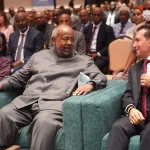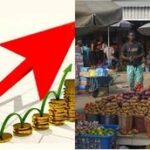As Christmas approaches, Nigerians face mounting financial strain due to relentless inflation that continues to erode their purchasing power.
The cost of essential items crucial for a festive celebration has surged, leaving many households grappling with financial constraints.
Join our WhatsApp ChannelAccording to the National Bureau of Statistics (NBS), November 2023 witnessed a 28.2% headline inflation rate, marking the 11th consecutive month of increases and hitting the highest level since July 2005.
The inflation surge, propelled by escalating costs of food, beverages, transport, and other essentials, has created an arduous financial landscape for Nigerians during this holiday season.
READ ALSORising Food Prices Bite Nigerians As Headline Inflation Hits 28.20% In Latest NBS Data
Inflation’s Impact on Essential Goods
The average cost of acquiring food and drinks has surged by a whopping 92.73% over the past three years, as indicated by the NBS composite consumer price index.
Families are expected to allocate a larger portion of their December income to procure basic food items, with food inflation reaching 32.84%.
Key food items such as rice, bread, yam, vegetables, and tomatoes have experienced price hikes, with local and imported rice prices soaring by 105% and 92%, respectively, within three years.
Additionally, the cost of popular festive proteins like frozen chicken has spiked by 107%, further burdening households aiming for traditional Christmas meals.
Christmas Clothing and Transportation Woes
The expense of clothing and footwear has surged by 57.48% over the same period, making it challenging for families to afford new outfits for the festive season.
Moreover, transport costs have surged by 74.65% in three years, exacerbating the financial strain on individuals like Happiness Bam, who cannot afford the expenses of visiting family during Christmas.
Government Intervention and Criticism
In an attempt to alleviate the burden on Nigerians, President Tinubu approved a 50% discount on road transport from December 21, 2023, to January 4, 2024. However, criticisms from figures like Peter Obi surfaced, highlighting concerns about transparency and oversight regarding the transport companies implementing the discount.
The Burden of Inflation
With the steep rise in headline inflation to 28.2%, Nigerian households are compelled to allocate a portion of their earnings to afford basic commodities, drastically altering their traditional Christmas celebrations.
As the prices of essential items skyrocket, families are forced to cut down on purchases and alter longstanding customs, impacting the joy of the festive season.
Regional Disparities
Certain states, including Kogi, Lagos, and Rivers, are experiencing particularly acute financial pressure, making Christmas expenditures an even more challenging prospect for residents.
In the face of unprecedented inflation, Nigerians are navigating an economic landscape that demands difficult trade-offs, fundamentally reshaping the character of their holiday celebrations.
Emmanuel Ochayi is a journalist. He is a graduate of the University of Lagos, School of first choice and the nations pride. Emmanuel is keen on exploring writing angles in different areas, including Business, climate change, politics, Education, and others.



















Follow Us